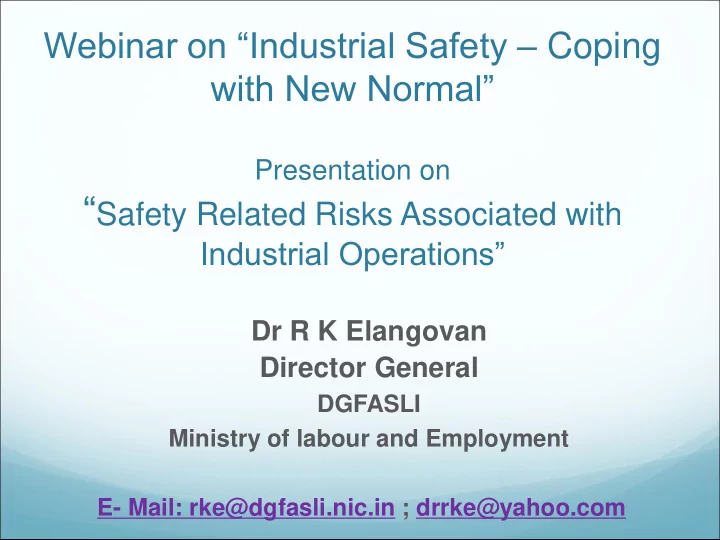

Webinar on “Industrial Safety – Coping with New Normal” Presentation on “ Safety Related Risks Associated with Industrial Operations” Dr R K Elangovan Director General DGFASLI Ministry of labour and Employment E- Mail: rke@dgfasli.nic.in ; drrke@yahoo.com
National Policy on SHE at Workplaces Policy was declared in 20.02.2009 Recognizing OSH as a Fundamental Human Right
The Factories Act, 1948 Provisions relating to occupational safety, Health and Welfare at Work Places. • Central legislation extends to whole country, last amended in 1987 • Power to make rules with States • DGFASLI – prime body to frame model rules • Schedules: First Schedule - List of factories involving hazardous processes, Second Schedule - Permissible levels of certain chemical substances in work environment and Third Schedule - List of notifiable occupational diseases.
Important legislations that provide regulations for better work environment and control of pollution in general… • The Factories Act, 1948 and State Factories Rules, • Environment protection act, 1986, and rules made there under. • Manufacture, storage and import of hazardous chemical rules, 1989 .
ILO Statistics… The ILO estimates that some 2.3 million women and men around the world succumb to work-related accidents or diseases every year; this corresponds to over 6000 deaths every single day. Worldwide, there are around 340 million occupational accidents and 160 million victims of work-related illnesses annually. Over one million work-related deaths occur annually according to ILO estimates and hundreds of millions of workers suffer from workplace accidents and occupational exposure to hazardous substances worldwide.
DGFASLI Statistics of Factories at a Glance: 2017 Total registered factories 339931; working factories 288845 Employment Total 16409493; Women 2474192 Total Safety Officers 4368; Medical Officers 3349 No. of factories having Safety Policy - 26621; Safety Committees - 20649 No. of Hazardous Process factories - 37222 No. of factories having On-site Emergency Plan - 1924 Total Injuries 5950; Fatal Injuries 1084
Requirements for ensuring OSH…
General Duties of the Occupier Ensure, so far as is reasonably practicable, the health, safety and welfare of all workers while they are at work in the factory. Plant and systems of work that are safe and without risks to health. safety with the use, handling, storage and transport of articles and substances. The provision of such information, instruction, training and supervision. The maintenance of all places of work in the factory in a condition that is safe and without risks to health ; Safe access and egress Working environment in the factory for the workers that is safe.
Specific Requirements… The starting/restarting/regular operations shall be carried out only as per the laid down procedures, protocols and guidelines in the presence of the technical team. The Pre Startup Safety Review (PSSR) shall be done before starting the plant and the identified hazards through PSSR study shall be eliminated, prevented and controlled before starting the plant. The permissible limits of exposure of chemical and toxic substances, as laid down under Section 41-F of the Factories Act, 1948, are never exceeded.
Specific Requirements… Supply and use of adequate and appropriate Personal Protective Equipment (PPE) in conformance with National Standards to protect against exposure to the toxic gases and fumes. Strict adherence to work permits, Standard Operating Procedures (SOP’s) and Standard Operating Procedures (SMP’s) of the factory. MSDS, Hazardous Materials Identification System(HMIS) labelling; First Aid, Fire fighting and Emergency Procedures; Safe Storage, handling and processing of chemicals
Specific Requirements… Ensure proper functioning of Safety Instrumented Systems, which comprises of sensors, logic solvers, and final control elements. Check for corrosion of pipelines, vessels, storage tanks, process equipment etc, including the stability of structures, thus ensuring and validating mechanical and structural integrity of the plant. Robust on-site and off-site emergency planning shall be made available in the factory. The emergency team leaders, team members, equipment and facilities shall also be made available in the factory as per the approved emergency plans.
Thank You… rke@dgfasli.nic.in drrke@yahoo.com
Recommend
More recommend